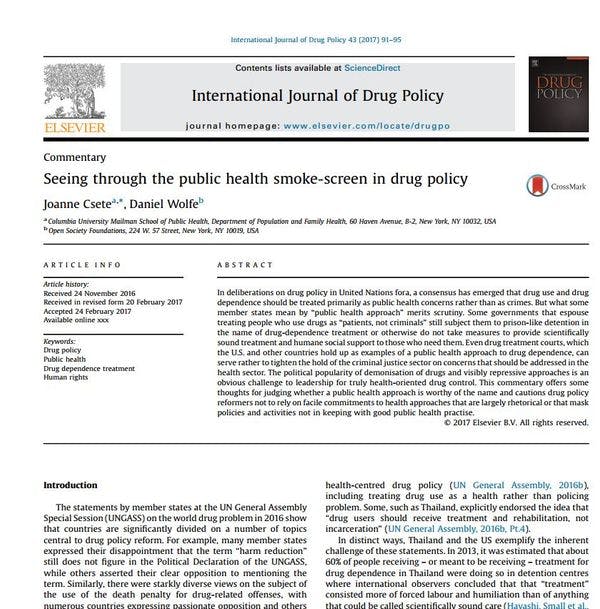พิจารณาดูแนวงานสาธารณสุขผ่านม่านควันในงานนโยบายยา
ในการอภิปรายเกี่ยวกับนโยบายด้านยาเสพติดบนเวทีระดับสหประชาชาติได้มีฉันทามติเห็นได้ชัดว่าการใช้ยาเสพติดและการพึ่งพายาเสพติดควรได้รับการรักษาเป็นหลัก เนื่องจากเป็นประเด็นด้านสาธารณสุข แทนที่จะถือเป็นอาชญากรรม แต่รัฐสมาชิกบางรัฐได้มีตีความหมายการจัดการปัญหาโดยใช้ แนวทางด้านสาธารสุข แตกต่างกันไป บางรัฐที่บอกว่านำแนวทางสาธารณสุขมาใช้ในการแก้ไขปัญหายาและบอกว่า "ผู้ป่วยไม่ใช่อาชญากร" ในทางปฏิบัติกลับยังมีการคุมขังผู้ใช้ยาภายใต้แนวทางนี้ หรือมิฉะนั้นก็ไม่ได้ใช้มาตรการเพื่อให้มีการรักษาทางวิทยาศาสตร์อย่างเป็นธรมหรือมีการสนับสนุนทางสังคมอย่างมีมนุษยธรรมให้แก่ผู้ที่ใช้ยาเสพติด แม้แต่ศาลด้านการรักษาด้วยยาซึ่งสหรัฐฯและประเทศอื่นๆ ถือเป็นตัวอย่างแนวทางด้านการสาธารณสุขในการพึ่งพายาเสพติดก็สามารถช่วยให้กระชับความยุติธรรมของกระบวนการยุติธรรมในประเด็นสุขภาพ ความนิยมทางการเมืองในการสร้างภาพลักษณ์อันเลวร้ายของของยาและวิธีการปราบปรามที่เห็นได้ชัดคือความท้าทายที่ชัดเจนในการเป็นผู้นำในการควบคุมยาอย่างแท้จริง ความคิดเห็นนี้มีแนวคิดในการตัดสินว่าแนวทางด้านสาธารณสุขนั้นจะมีคุณค่าจริงหรือไม่ ควรหรือไม่ที่มีการใช้แค่ชื่อเป็นแนวทางการแก้ปัญหายา แต่ควรมีการเตือนการปฏิรูปนโยบายยาเสพติดโดยไม่ต้องพึ่งพาคำมั่นสัญญาที่มีต่อแนวทางสุขภาพที่เป็นเพียงสำนวนอ้างอิง โดยที่การกำหนดนโยบายและกิจกรรมก็ยังที่ไม่สอดคล้องกับแนวปฏิบัติด้านสาธารณสุขที่ดี
สมัครสมาชิก แจ้งข่าว IDPC ทุกเดือน เพื่อรับข้อมูลเกี่ยวกับประเด็นที่เกี่ยวข้องกับนโยบายยาเสพติด
กรุณาดูด้านล่างสำหรับข้อมูลเพิ่มเติมเป็นภาษาอังกฤษ
In deliberations on drug policy in United Nations fora, a consensus has emerged that drug use and drug dependence should be treated primarily as public health concerns rather than as crimes. But what some member states mean by “public health approach” merits scrutiny. Some governments that espouse treating people who use drugs as “patients, not criminals” still subject them to prison-like detention in the name of drug-dependence treatment or otherwise do not take measures to provide scientifically sound treatment and humane social support to those who need them. Even drug treatment courts, which the U.S. and other countries hold up as examples of a public health approach to drug dependence, can serve rather to tighten the hold of the criminal justice sector on concerns that should be addressed in the health sector. The political popularity of demonisation of drugs and visibly repressive approaches is an obvious challenge to leadership for truly health-oriented drug control. This commentary offers some thoughts for judging whether a public health approach is worthy of the name and cautions drug policy reformers not to rely on facile commitments to health approaches that are largely rhetorical or that mask policies and activities not in keeping with good public health practise.
Click here to read the full paper
Keep up-to-date with drug policy developments by subscribing to the IDPC Monthly Alert.
Topics
Regions
Related Profiles
- Open Society Foundations (OSF)
